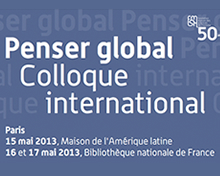Notice
Transform, Reconnect and Survive: Inter-Galaxy review of Humanity on Earth - Discours d’ouverture “Keynote address” par Yuan Tseh Lee
- document 1 document 2 document 3
- niveau 1 niveau 2 niveau 3
Descriptif
Yuan Tseh Lee, membre du Haut Conseil du Collège d’études mondiales, prix Nobel de chimie, président de l’ICSU
2033 marks the end of human denial and hubris. We’ve just gone past 450ppm CO2 concentration in the atmosphere. Climate change, environmental degradation and resource depletion are all much worse than any expert ever imagined. Humanity now knows the party is over. It just doesn’t know whether it’ll survive the hangover.
With options running out, world leaders turn towards extra-terrestrial civilizations for guidance and help (contact was made just 3 years earlier). In response, an Inter-Galaxy Review Task Force visits earth to conduct a Review of Humanity on Earth. Task Force members all hail from alien civilizations that have thrived for at least 10 million years, making them uniquely qualified to evaluate earth and its young master species.
After 3-months of investigation, the Task Force delivered to the United Nations a 1,000-page Review Report of Humanity on Earth. The report lays out in stunning detail the story of human development on earth:
How Homo Sapiens arose as the dominant species on earth… but for thousands of years still lived on sunshine and biomass, within the planet’s capacity to support.
Then came the Industrial Revolution and the rise of Fossil Energy… which led to…
Turning Point #1 – the Great Separation… of humans from sunshine and nature; of people from their resource base and ecological impacts; of rich nations from poor nations, wealthy people from poor people; and of systems into sectors and silos.
This led to some Great Paradigm Shifts… seeing nature as property and resource, the frantic pursuit of unlimited growth, profit, material wealth and consumption.
And it had Great Consequences… climate change, biodiversity loss and ecosystem decline, resource depletion, social injustice, political conflict, extreme disasters, and the risk of crossing planetary boundaries and triggering disastrous tipping points
The Review Report then concluded with an open question: Will there be a Turning Point #2 – the Great (Re) Connection? Will earthlings be able to achieve a sustainability transformation that
- (Re) connects humanity with sunshine (their most powerful energy source)?
- (Re) connects humanity with nature in a harmonious relationship?
- (Re) connects competing nations and the rich and poor into a global community that works together to solve global problems?
- (Re) connects all branches of knowledge into a holistic, integrated, systemic approach for global transformation?
Dire as the situation is on earth, the alien Review Task Force still holds “guarded optimism”. They’ve seen planetary civilizations sink and perish; but they have also seen them right the ship in the nick of time. Humanity has all the right tools – ingenuity and wisdom, science and technology, love and compassion, persistence and courage. But not a second is to be lost in acting to save this remarkable planet and civilization.
Dans la même collection
-
Décider de la vie
FRYDMAN René
RAINHORN Jean-Daniel
NGUYEN Vinh-Kim
FOURNIER Véronique
Colloque international PENSER GLOBAL Internationalisation et globalisation des sciences humaines et sociales À l’occasion de son 50e anniversaire, la Fondation Maison des sciences de l’homme invite
-
Espaces concrets, espaces virtuels
DIMINESCU Dana
STOCKINGER Peter
TUBELLA CASADEVALL Imma
Colloque international PENSER GLOBAL Internationalisation et globalisation des sciences humaines et sociales À l’occasion de son 50e anniversaire, la Fondation Maison des sciences de l’homme invite
-
Complexity and Expulsion
SASSEN Saskia
WIEVIORKA Michel
SENNETT Richard
Colloque international PENSER GLOBAL Internationalisation et globalisation des sciences humaines et sociales À l’occasion de son 50e anniversaire, la Fondation Maison des sciences de l’homme invite
-
Religion, culture et sécularisation - VF
GöLE Nilüfer
BAUBéROT Jean
BOUTRY Philippe
SHAIKH Farzana
Colloque international PENSER GLOBAL Internationalisation et globalisation des sciences humaines et sociales À l’occasion de son 50e anniversaire, la Fondation Maison des sciences de l’homme invite
-
Globalización y democracia
FERNáNDEZ Leonel
LAGOS ESCOBAR Ricardo
OTTONE FERNáNDEZ Ernesto
ROUQUIé Alain
CARDOSO Fernando Henrique
Une autre globalisation est-elle possible ? La contribution de l’Amérique Latine Président : Ernesto Ottone, titulaire de la chaire « Destins de l’Amérique latine » du Collège d’études
-
Table ronde des Fondations
BOUIN Olivier
The funding of cross-disciplinary research. The potential for foundations to foster innovative researches tackling pressing global issues Table ronde animée par Olivier Bouin, directeur de la
-
Récits et globalisation - VF
BHARGAVA Rajeev
BOKSER DE LIWERANT Judit
MIRDAL Gretty
STOCK Brian
Colloque international PENSER GLOBAL Internationalisation et globalisation des sciences humaines et sociales À l’occasion de son 50e anniversaire, la Fondation Maison des sciences de l’homme invite
-
Demain: quel(s) monde(s) ?
TOURAINE Alain
DELMAS-MARTY Mireille
BLANQUER Jean-Michel
SACHS Ignacy
Colloque international PENSER GLOBAL Internationalisation et globalisation des sciences humaines et sociales À l’occasion de son 50e anniversaire, la Fondation Maison des sciences de l’homme invite
-
L'universel et l'altérité
JULLIEN François
BATAILLE Philippe
RACINE Jean-Luc
SCHEMEIL Yves
Colloque international PENSER GLOBAL Internationalisation et globalisation des sciences humaines et sociales À l’occasion de son 50e anniversaire, la Fondation Maison des sciences de l’homme invite
-
Justice et cosmopolitisme en question - VO
ANDERSON Elijah
FRASER Nancy
CALHOUN Craig Jackson
NOWOTNY Helga
Colloque international PENSER GLOBAL Internationalisation et globalisation des sciences humaines et sociales À l’occasion de son 50e anniversaire, la Fondation Maison des sciences de l’homme invite
-
Globalisation et démocratie
FERNáNDEZ Leonel
LAGOS ESCOBAR Ricardo
OTTONE FERNáNDEZ Ernesto
ROUQUIé Alain
CARDOSO Fernando Henrique
Une autre globalisation est-elle possible ? La contribution de l’Amérique Latine Président : Ernesto Ottone, titulaire de la chaire « Destins de l’Amérique latine » du Collège d’études
-
Espaces et récits de la politique et de la géopolitique
PELLETIER Denis
DOZON Jean-Pierre
FOUCHER Michel
LE BRAS Hervé
Colloque international PENSER GLOBAL Internationalisation et globalisation des sciences humaines et sociales À l’occasion de son 50e anniversaire, la Fondation Maison des sciences de l’homme invite


